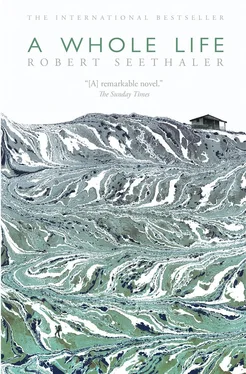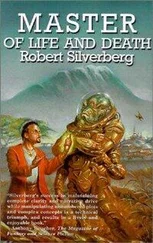Robert Seethaler - A Whole Life
Здесь есть возможность читать онлайн «Robert Seethaler - A Whole Life» весь текст электронной книги совершенно бесплатно (целиком полную версию без сокращений). В некоторых случаях можно слушать аудио, скачать через торрент в формате fb2 и присутствует краткое содержание. Год выпуска: 2015, Издательство: House of Anansi Press Inc, Жанр: Современная проза, на английском языке. Описание произведения, (предисловие) а так же отзывы посетителей доступны на портале библиотеки ЛибКат.
- Название:A Whole Life
- Автор:
- Издательство:House of Anansi Press Inc
- Жанр:
- Год:2015
- ISBN:нет данных
- Рейтинг книги:4 / 5. Голосов: 1
-
Избранное:Добавить в избранное
- Отзывы:
-
Ваша оценка:
- 80
- 1
- 2
- 3
- 4
- 5
A Whole Life: краткое содержание, описание и аннотация
Предлагаем к чтению аннотацию, описание, краткое содержание или предисловие (зависит от того, что написал сам автор книги «A Whole Life»). Если вы не нашли необходимую информацию о книге — напишите в комментариях, мы постараемся отыскать её.
Set in the mid-twentieth century and told with beauty and tenderness, his story is one of man's relationship with an ancient landscape, of the value of solitude, the arrival of the modern world, and above all, of the moments, great and small, that make us who we are.
A Whole Life — читать онлайн бесплатно полную книгу (весь текст) целиком
Ниже представлен текст книги, разбитый по страницам. Система сохранения места последней прочитанной страницы, позволяет с удобством читать онлайн бесплатно книгу «A Whole Life», без необходимости каждый раз заново искать на чём Вы остановились. Поставьте закладку, и сможете в любой момент перейти на страницу, на которой закончили чтение.
Интервал:
Закладка:
Egger’s stay in the village was brief. ‘You’re too old. And you limp,’ said the officer who, along with the mayor and an elderly female typist, formed the examination committee. He was sitting in the Golden Goat, at one of the guesthouse tables, which was covered in a white tablecloth and decorated with little swastika flags.
‘I want to go to war,’ said Egger.
‘Do you think the Wehrmacht can use someone like you?’ asked the officer. ‘Who do you think we are?’
‘Don’t be stupid, Andreas, go back to your work,’ said the mayor. And that was the end of the matter. The typist stamped the single sheet of paper that constituted his file, and Egger returned to the cable cars.
Just over three years later, in November 1942, Egger stood before the same committee, not as a volunteer this time but as a conscript. He had no idea why the Wehrmacht suddenly could use someone like him after all: at any rate, it seemed that times had changed.
‘What can you do?’ the officer asked.
‘I know about mountains,’ answered Egger. ‘I can sand steel cables and make holes in rock.’
‘That’s good,’ the officer remarked. ‘Have you ever heard of the Caucasus?’
‘No,’ said Egger.
‘Never mind,’ said the officer. ‘Andreas Egger, I hereby declare you fit to go to war. You have been assigned the honourable task of liberating the East!’
Egger looked out of the window. It had started to rain: fat drops smacked against the window, darkening the restaurant. Out of the corner of his eye he saw the mayor slowly hunch over the table and stare down at its surface.
Egger spent a total of more than eight years in Russia. Less than two months of this were at the front; the rest was in a prisoner-of-war camp somewhere in the vast steppe north of the Black Sea. Although in the beginning his mission still seemed fairly clear (as well as liberating the East it was also about securing oil reserves and defending and maintaining planned production facilities), after just a few days he could no longer have said exactly why he was there, or for what or against whom he was actually fighting. It was as if in these pitch-dark Caucasian winter nights, when shell-fire blossomed like blazing flowers over the mountain crests on the horizon, casting its light on the soldiers’ fearful or despairing or blank faces, any thought about purpose or the lack of it was stifled before it could be formulated. Egger questioned nothing. He carried out orders, that was all. Besides, he was of the opinion that he could have had it an awful lot worse. Just a few weeks after his arrival in the mountains, two taciturn comrades who were clearly familiar with the area brought him by night to a narrow rocky plateau at an altitude of around four thousand metres. One of his superiors had explained to him that he was to stay there until he was recalled, firstly to set a series of blast holes, secondly to secure the forward position and, if necessary, to hold it. Egger had no idea what forward position they were referring to or even what such a position might be, but he wasn’t dissatisfied with his task. His two comrades left him there alone, with tools, a tent, a crate of provisions and the promise to return once a week with fresh supplies, and Egger made himself at home as best he could. During the day he bored dozens of holes in the rock, for which he often had first to hack away a thick layer of ice, and at night he lay in his tent and tried to sleep despite the biting cold. His equipment included a sleeping bag, two blankets, his fur-lined winter boots, and the thick, quilted jacket worn by mountain troops. He had also pitched the tent half inside a frozen snowdrift, and this provided him with at least a little shelter from the wind, which often howled so loudly that it drowned out the roaring of the bombers and the muffled explosions of the anti-aircraft guns. Yet all this was not enough to keep out the cold. The frost seemed to creep in through every seam, under clothing and under the skin, digging its claws into every fibre of his body. Making a fire was forbidden and punishable by death, but even had it been permitted, the plateau lay far above the tree line and for miles around there wasn’t so much as a twig that Egger could have burned. Sometimes he would light the little petrol stove he used to heat the tinned food, but the tiny flames just seemed to mock him. They burned his fingertips and left the rest of his body to freeze all the more. Egger feared the nights. He lay huddled in his sleeping bag and the cold brought tears to his eyes. Sometimes he dreamed: confused dreams, filled with pain and hideous faces that materialized in the blizzard of his mind and hunted him down. Once he awoke from just such a dream because he thought that something soft and mobile had crept into the tent and was staring at him. ‘Jesus!’ he gasped softly. He waited until his heart had calmed again, then slipped from his sleeping bag and crawled out of the tent. The sky was starless and profoundly black. Everything around him was wrapped in darkness and altogether silent. Egger sat on a stone and stared out into the night. Again he heard his heart pounding, and at that moment he knew he was not alone. He couldn’t say where this feeling came from; he saw only the blackness of the night and heard his heartbeat, but somewhere out there he sensed the presence of another living creature. He had no idea how long he sat like that in front of his tent, listening out into the darkness, but before the first pale strip of light appeared over the mountains he knew where this other creature was located. About thirty metres away, on the other side of the ravine that marked the western edge of the plateau, there was a spur that jutted out of the face of the rock, scarcely wide enough for a goat to gain a foothold. On the ledge stood a Russian soldier, his shape rapidly becoming clearer in the growing light of dawn. He was just standing there, inexplicably motionless, looking across at Egger, who for his part remained sitting on his stone, not daring to move. The soldier was young and had the milky face of a city boy. His forehead was smooth and snowy white, his eyes oddly slanting. He carried his weapon, a Cossack rifle without a bayonet, on a strap over his shoulder; his right hand lay calmly on the stock. The Russian looked at Egger and Egger looked at the Russian and around them was nothing but the silence of a Caucasian winter morning. Later, Egger could not have said which of them was first to move: a spasm passed through the soldier’s body and, at the same time, Egger stood. The Russian removed his hand from the rifle stock and wiped his forehead with his sleeve. Then he turned and quickly, nimbly, without looking back, climbed up a few metres and disappeared between the rocks.
Egger stayed where he was for a moment, thinking. He realized that he had been standing face to face with his mortal enemy, yet now that the soldier had disappeared he felt his loneliness more profoundly than ever before.
At first his two comrades came every few days, as agreed, to stock up his food supplies and, when necessary, to bring a pair of woollen socks or a new rock drill, as well as news from the front (things were seesawing back and forth, there had been losses but also some gains, all in all no one really knew what was going on). But after a few weeks the visits stopped, and towards the end of December — Egger was scoring the days onto a sheet of ice with the drill, and by his count it must have been the day after Christmas — he started to suspect that they wouldn’t be coming again. On the first of January 1943, after another week had gone by and still no one had turned up, he set off in thick, driving snow to walk back down to the camp. He followed the path they had come up almost two months earlier and was relieved when he soon saw the familiar red of the swastikas glimmering towards him. Within seconds, though, it abruptly dawned on him that the flags driven into the ground ahead to mark the camp perimeter were not swastikas at all, but the banners of the Russian Soviet Socialist Republic. In that moment Egger owed his life entirely to the presence of mind with which he immediately tore his rifle off his back and flung it as far away from him as he could. He saw the gun disappear into the snow with a muffled thud, and a split second later he heard the shouts of the guards running towards him. He raised his hands, fell to his knees and bowed his head. He felt a blow to the back of his neck, toppled forwards, and heard deep Russian voices speaking over him like incomprehensible sounds from another world.
Читать дальшеИнтервал:
Закладка:
Похожие книги на «A Whole Life»
Представляем Вашему вниманию похожие книги на «A Whole Life» списком для выбора. Мы отобрали схожую по названию и смыслу литературу в надежде предоставить читателям больше вариантов отыскать новые, интересные, ещё непрочитанные произведения.
Обсуждение, отзывы о книге «A Whole Life» и просто собственные мнения читателей. Оставьте ваши комментарии, напишите, что Вы думаете о произведении, его смысле или главных героях. Укажите что конкретно понравилось, а что нет, и почему Вы так считаете.











